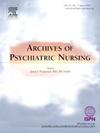精神病-心理健康护理教科书中分离和相关概念的覆盖范围
IF 2.2
4区 医学
Q1 NURSING
引用次数: 0
摘要
目的:护士和护士教育工作者认为缺乏与分离性障碍(dd)和分离性症状相关的知识、教育、培训和教材。此外,护士和护士教育工作者报告了围绕这些概念的教学偏见。先前对本科精神病理学教科书的研究表明,分离和相关概念的覆盖不足且不准确,但在护理专业中没有进行过此类研究。因此,本研究的目的是评估精神-心理健康(PMH)护理教科书中DDs、分离和相关症状的表现。方法采用定性内容分析方法,对8本流行的PMH护理教材中ddds、游离性及相关概念的覆盖范围进行评价。结果通过对8本PMH护理教材的定性内容分析,得出4类结论:(1)游离性精神分裂症和离散性精神障碍有许多危险因素,但护理人员应从创伤认识的角度来看待这些现象;(2)护士可以期待什么:对分离个体的评估结果;(3)与分离、dd及其相关症状的诊断和治疗相关的争议和耻辱感持续存在;(4)循证护理干预在预防和治疗分离、抑郁、相关症状管理方面是有效的。结论:除了一本经审查的PMH护理教科书外,分离和相关概念的覆盖范围总体上是充分的,以证据为基础的,在某些情况下,相当广泛和健全。在PMH护理教科书中准确、全面的解离、DDs和相关概念的支持下,护士教育者应该将这些内容纳入他们的PMH护理课程。本文章由计算机程序翻译,如有差异,请以英文原文为准。
Coverage of dissociation and related concepts in psychiatric-mental health nursing textbooks
Purpose
Nurses and nurse educators perceive a lack of knowledge, education, training, and educational materials related to dissociative disorders (DDs) and dissociative symptoms. Additionally, nurses and nurse educators report bias around the teaching of these concepts. Previous research on undergraduate psychopathology textbooks indicated insufficient and inaccurate coverage of dissociation and related concepts, but no such studies had been conducted within the profession of nursing. Therefore, the purpose of this study was to assess the presentation of DDs, dissociation, and related symptoms in psychiatric-mental health (PMH) nursing textbooks.
Method
Qualitative content analysis was used to evaluate the coverage of DDs, dissociation, and related concepts in eight popular PMH nursing textbooks.
Results
Following qualitative content analysis of the eight PMH nursing textbooks, four categories were generated: (1) Dissociation and DDs have many risk factors, but nurses should examine these phenomena through a trauma-informed lens; (2) What nurses can expect: Assessment findings for individuals who dissociate; (3) Ongoing controversy and stigma exist related to the diagnosis and treatment of dissociation, DDs, and related symptoms; and (4) Evidence-based nursing interventions are effective in the prevention and treatment of dissociation, DDs, and management of related symptoms.
Conclusions
With the exception of one PMH nursing textbook that was reviewed, coverage of dissociation and related concepts was generally adequate, evidence-based, and in some cases, quite extensive and robust. Supported by the accurate, comprehensive coverage of dissociation, DDs, and related concepts in PMH nursing textbooks, nurse educators should routinely incorporate this content into their PMH nursing courses.
求助全文
通过发布文献求助,成功后即可免费获取论文全文。
去求助
来源期刊
CiteScore
3.70
自引率
0.00%
发文量
131
审稿时长
160 days
期刊介绍:
Archives of Psychiatric Nursing disseminates original, peer-reviewed research that is of interest to psychiatric and mental health care nurses. The field is considered in its broadest perspective, including theory, practice and research applications related to all ages, special populations, settings, and interdisciplinary collaborations in both the public and private sectors. Through critical study, expositions, and review of practice, Archives of Psychiatric Nursing is a medium for clinical scholarship to provide theoretical linkages among diverse areas of practice.

 求助内容:
求助内容: 应助结果提醒方式:
应助结果提醒方式:


